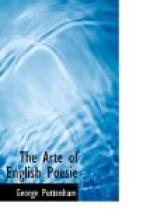A staffe of foure verses containeth in it selfe matter sufficient to make a full periode or complement of sence, though it doe not alwayes so, and therefore may go by diuisions.
A staffe of fiue verses, is not much vsed because he that can not comprehend his periode in foure verses, will rather driue it into six then leaue it in fiue, for that the euen number is more agreeable to the eare then the odde is.
A staffe of sixe verses, is very pleasant to the eare, and also serueth for a greater complement then the inferiour staues, which maketh him more commonly to be vsed.
A staffe of seuen verses, most vsuall with our auncient makers, also the staffe of eight, nine and ten of larger complement then the rest, are onely vsed by the later makers, & vnlesse they go with very good bande, do not so well as the inferiour staues. Therefore if ye make your staffe of eight, by two fowers not entertangled, it is not a huitaine or a staffe of eight, but two quadreins, so is it in ten verses, not being entertangled they be but two staues of fiue.
CHAP. III.
Of proportion in measure.
Meeter and measure is all one, for what the Greekes call [Greek: metron], the Latines call Mensura, and is but the quantitie of a verse, either long or short. This quantitie with them consisteth in the number of their feete: & with vs in the number of sillables, which are comprehended in euery verse, not regarding his feete, otherwise then that we allow in scanning our verse, two sillables to make one short portion (suppose it a foote) in euery verse. And after that sort ye may say, we haue feete in our vulgare rymes, but that is improperly: for a foote by his sence naturall is a member of office and function, and serueth to three purposes, that is to say, to go, to runne, & to stand still so as he must be sometimes swift, sometimes slow, sometime vnegally marching or peraduenture steddy. And if our feete Poeticall want these qualities it can not be sayd a foote in sence translatiue as here. And this commeth to passe, by reason of the euident motion and stirre, which is perceiued in the sounding of our wordes not alwayes egall: for some aske longer, some shorter time to be vttered in, & so by the Philosophers definition, stirre is the true measure of time. The Greekes & Latines because their wordes hapned to be of many sillables, and very few of one sillable, it fell out right with them to conceiue and also to perceiue, a notable diuersitie of motion and times in the pronuntiation of their wordes, and therefore to euery bissillable they allowed two times, & to a trissillable three times, & to euery polisillable more, according to his quantitie, & their times were some long, some short according as their motions were slow or swift. For the sound of some sillable stayd the eare a great while, and others slid away so quickly, as if they had not bene pronounced, then euery sillable




